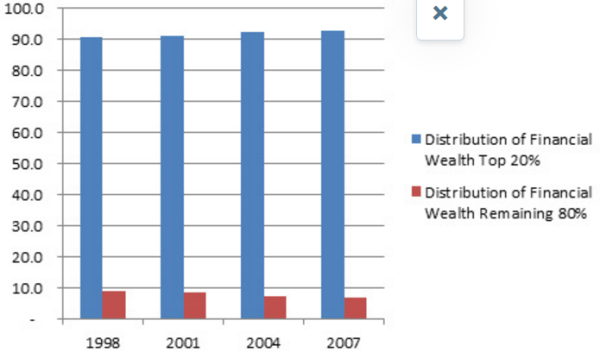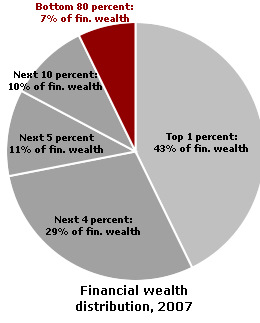This follows my post of the Ralph Nader video. I have read much lately about the growing unfairness of income distribution in North America and the organized efforts of our richest citizens to accelerate the trend. Super-rich like David and Charles Koch are not content with the concentration already achieved, they aim to make it worse by passing laws to destroy unions and collective bargaining and remove workers’ rights. Another objective is to defund government and privatize public sector services and enterprises.


An American survey completed in 2010 (Norton & Ariely) determined that most citizens have no idea just how concentrated wealth has actually become. The inequality is striking and has become worse in the last decade. This is a dangerous trend because a peaceful democratic society can not survive with this imbalance. Inequities have been the engines of revolution throughout history.
In British Columbia, we have seen a 10-year freeze in the minimum wage, reductions in labor standards, limitation of workers’ rights to bargain contracts and unilateral agreements imposed by law. There has been a steady decline in union membership as the province de-industrializes and focuses instead on service businesses and bulk commodity exports of minimally processed goods.
If current trends continue, we will be building houses with imported lumber milled in China from exported raw BC logs. The houses will be plumbed with pipes manufactured in the USA from Canadian petroleum and the houses wired with electrical cable made in China with copper refined there from Canadian ore.
In a Labour Day piece, I wrote about my own experience growing up in a BC coastal mill town, the economic basis of which was typical then. Sadly, these towns survive in far different forms today, if at all. This is an excerpt:
In modern times, the Canadian union movement has lost power and influence so it’s easy to forget that unions enabled a broad middle class. Workers in unionized company towns in BC’s 20th century resource economy set the bar for others. They showed how positive full employment with good wages enables high quality life for the entire community.
I experienced that because I was schooled in Powell River and what was then the world’s largest pulp and paper mill provided good jobs and reasonable supports to almost any local family with a member who chose to work there. High school graduates – well, males anyway – were almost guaranteed summer employment if they went on to university. Countless people who became lawyers, engineers, accountants and other professionals had their higher educations enabled. Not just in Powell River either. Other single industry towns, with workers benefiting from healthy union wages, were similar.
These communities had comparatively few social problems, little poverty and excellent facilities, from schools to recreation centres. My wife and I recently attended our 45-year high school reunion in Powell River. People returned from all over to join with those still resident in the coastal town. Interestingly, over 90% of our class survive and hold happy memories of our youth. Sadly, the great employment opportunities we had are mostly gone, with the paper mill now a shadow of its former self. It offers fewer than 15% of the jobs that it provided in 1964 and none of those are secure.
Further reading:
- Who Rules America? Website of G. William Domhoff, University of California
- New Internationalist, interview with G. William Domhoff
- The United States of Inequality, by Timothy Noah
- Koch Brothers War Against Obama, Jane Mayer, New Yorker
- Money in Politics, Mother Jones
- The Guardian, Reel in the Non-Doms, Tax Cheating
Categories: Income Inequality




This has been a problem for many years but just lately it has seemed that people have been going elsewhere for work, which does not help BC's economy at all. Raising wages or having a more accessible work place would not only benefit the company but also BC as a whole.
LikeLike
Thank you Norman.
Many thanks, as always.
LikeLike
Link added within article text.
LikeLike
Norm,
Could you post links to the story and the graphs.
Thanks
LikeLike
The statistics I've found indicate that the previous greatest inequity of this sort in the US was at the start of the last Depression, but current numbers are even worse. FDR, a scion of the elite himself, but either with a conscience or just married to a woman with one, implemented the new deal to forestall revolution and fight socialism/communism, which hadn't been relegated to the category of “bad words,” and seemed an attractive alternative to great swathes of the population.
Today, thanks to decades of military spending and propaganda, helped by some autocratic despots like Pol Pot and Stalin, and continued demonizing even of less tyrannical socialist/communist governments, socialism isn't an option leaving only armed insurrection if democratic process can't restore balance.
Of course this is the reason Governor Walker in Wisconsin cut slack for the police while attacking most other public sector employees. Likewise an awareness of this trend, and a desire to continue it, I believe motivated Herr Harper to mount his One Billion dollar exercise in crowd control last summer in Toronto.
This is one of the clearest explanations of what's going on that I have seen Norm, and should be on the front page of the Vancouver Sun. Or perhaps it could be the cover story in Macleans, if Macleans hadn't replaced all of the Byfeld (sp?) Reporter publications in its attempt to make the Economist appear to be an I.W.W. newsletter.
LikeLike
I remember as a kid growing up in the sixties going with my parents and my brother to visit my grandparents in Port Alberni for christmas.Everyone either worked in the mills,in the bush,or on the fishboats,and that supported a good many of the small businesses in that town.I also lived there as a young guy for a short time in the early eighties.Even then I noticed the decline.Empty storefronts downtown as MacBlo laid off workers so they could “modernize” their operations.Now, I realize that company towns like Port and Powell River take a hit when demand for lumber and pulp and paper are down but even then I saw the big forest giants exporting more and more raw logs,and good paying union jobs,to countries like Japan.
LikeLike
Norm, your insight as usual is superb. Your offerings are like gleaming gemstones of distilled wisdom.
The citizens of BC are being turned into wage-slaves for the uber-wealthy who we will serve (literally) when they deign to visit their lavish estates in “Beautiful BC”, the Best Place on Earth. The “tourist trade” is just the first and most modest step in that conversion.
However most people in the urban wasteland sip their lattes with nary a thought glanced that way. Oblivious to the gathering storm.
And our children? Well, they might only be able to aspire to becoming wage slaves in coffee houses. More likely they'll be drug runners and prostitutes. Or, human slaves if this trend really gathers steam before it implodes.
This is happening in other areas of the globe that have been stripped of their resources and rendered dependent on the whims of the lawyered-up Corporate Thug class. One obvious example is Russia, but there are many other regions where people are struggling to dig themselves out of the gutter that was left of their country or region after being raped and pillaged of their resources by corporate or government sharks.
God, how I pray we are near the end of the pendulum swing. I am so ready for a revolution. Shakespeare had it right all those centuries ago.
LikeLike